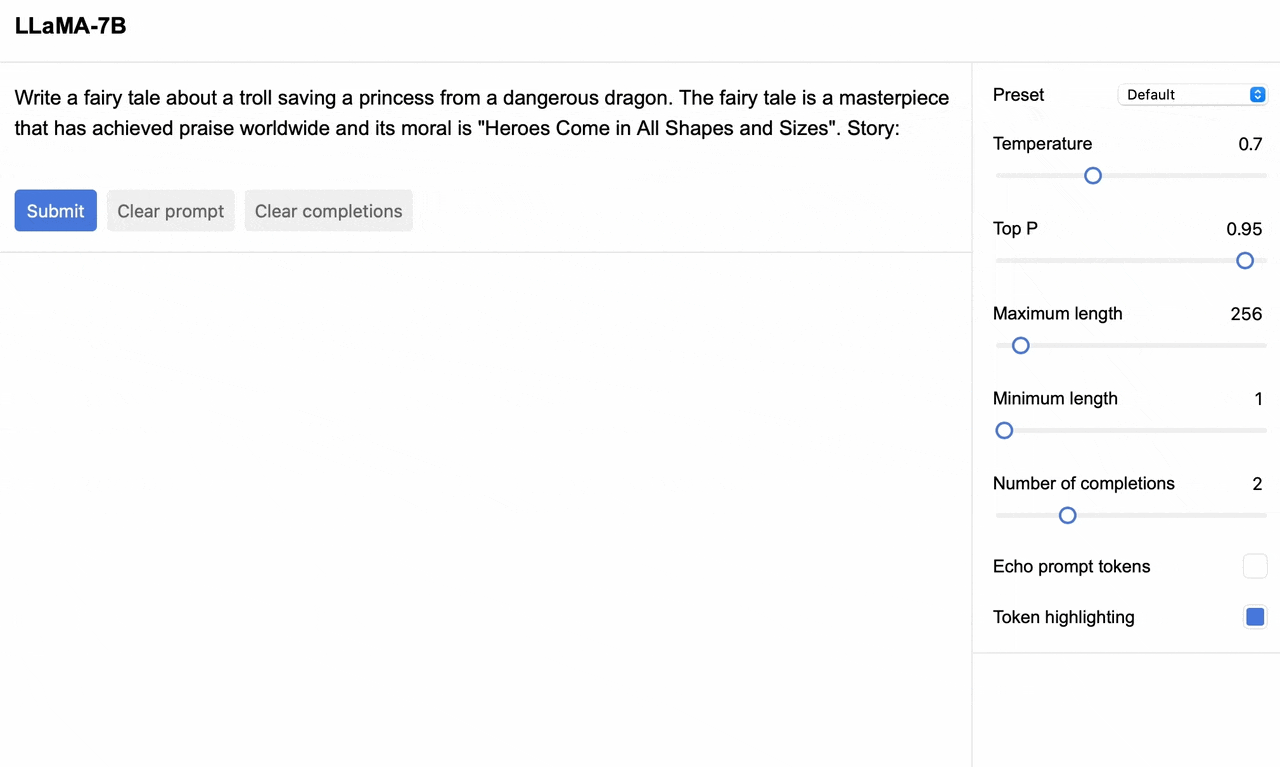Basaran is an open-source alternative to the OpenAI text completion API. It provides a compatible streaming API for your Hugging Face Transformers-based text generation models.
The open source community will eventually witness the Stable Diffusion moment for large language models (LLMs), and Basaran allows you to replace OpenAI's service with the latest open-source model to power your application without modifying a single line of code.
The key features of Basaran are:

Replace user/repo with your selected model and X.Y.Z with the latest version, then run:
docker run -p 80:80 -e MODEL=user/repo hyperonym/basaran:X.Y.ZAnd you're good to go!
Playground: http://127.0.0.1/
API: http://127.0.0.1/v1/completions
Docker images are available on Docker Hub and GitHub Packages.
For GPU acceleration, you also need to install the NVIDIA Driver and NVIDIA Container Runtime. Basaran's image already comes with related libraries such as CUDA and cuDNN, so there is no need to install them manually.
Basaran's image can be used in three ways:
MODEL="user/repo" environment variable, the corresponding model can be downloaded from Hugging Face Hub during the first startup.MODEL environment variable to the corresponding path.For the above use cases, you can find sample Dockerfiles and docker-compose files in the deployments directory.
Basaran is tested on Python 3.8+ and PyTorch 1.13+. You should create a virtual environment with the version of Python you want to use, and activate it before proceeding.
pip:pip install basaranpip install accelerate bitsandbytesuser/repo with the selected model and run Basaran:MODEL=user/repo PORT=80 python -m basaranFor a complete list of environment variables, see __init__.py.
If you want to access the latest features or hack it yourself, you can choose to run from source using git.
git clone https://github.com/hyperonym/basaran.git && cd basaranpip install -r requirements.txtuser/repo with the selected model and run Basaran:MODEL=user/repo PORT=80 python -m basaranBasaran's HTTP request and response formats are consistent with the OpenAI API.
Taking text completion as an example:
curl http://127.0.0.1/v1/completions
-H 'Content-Type: application/json'
-d '{ "prompt": "once upon a time,", "echo": true }'{
"id": "cmpl-e08c701b4ba032c09ef080e1",
"object": "text_completion",
"created": 1678003509,
"model": "bigscience/bloomz-560m",
"choices": [
{
"text": "once upon a time, the human being faces a complicated situation and he needs to find a new life.",
"index": 0,
"logprobs": null,
"finish_reason": "length"
}
],
"usage": {
"prompt_tokens": 5,
"completion_tokens": 21,
"total_tokens": 26
}
}If your application uses client libraries provided by OpenAI, you only need to modify the OPENAI_API_BASE environment variable to match Basaran's endpoint:
OPENAI_API_BASE="http://127.0.0.1/v1" python your_app.pyThe examples directory contains examples of using the OpenAI Python library.
Basaran is also available as a library on PyPI. It can be used directly in Python without the need to start a separate API server.
pip:pip install basaranload_model function to load a model:from basaran.model import load_model
model = load_model("user/repo")for choice in model("once upon a time"):
print(choice)The examples directory contains examples of using Basaran as a library.
Basaran's API format is consistent with OpenAI's, with differences in compatibility mainly in terms of parameter support and response fields. The following sections provide detailed information on the compatibility of each endpoint.
Each Basaran process serves only one model, so the result will only contain that model.
Although Basaran does not support the model parameter, the OpenAI client library requires it to be present. Therefore, you can enter any random model name.
| Parameter | Basaran | OpenAI | Default Value | Maximum Value |
|---|---|---|---|---|
model |
○ | ● | - | - |
prompt |
● | ● | "" |
COMPLETION_MAX_PROMPT |
suffix |
○ | ● | - | - |
min_tokens |
● | ○ | 0 |
COMPLETION_MAX_TOKENS |
max_tokens |
● | ● | 16 |
COMPLETION_MAX_TOKENS |
temperature |
● | ● | 1.0 |
- |
top_p |
● | ● | 1.0 |
- |
n |
● | ● | 1 |
COMPLETION_MAX_N |
stream |
● | ● | false |
- |
logprobs |
● | ● | 0 |
COMPLETION_MAX_LOGPROBS |
echo |
● | ● | false |
- |
stop |
○ | ● | - | - |
presence_penalty |
○ | ● | - | - |
frequency_penalty |
○ | ● | - | - |
best_of |
○ | ● | - | - |
logit_bias |
○ | ● | - | - |
user |
○ | ● | - | - |
Providing a unified chat API is currently difficult because each model has a different format for chat history.
Therefore, it is recommended to pre-format the chat history based on the requirements of the specific model and use it as the prompt for the completion API.
**Summarize a long document into a single sentence and ...**
<human>: Last year, the travel industry saw a big ...
<bot>: If you're traveling this spring break, ...
<human>: But ...
<bot>:
[Round 0]
问:你好
答:你好!有什么我可以帮助你的吗?
[Round 1]
问:你是谁?
答:
See the open issues for a full list of proposed features.
This project is open-source. If you have any ideas or questions, please feel free to reach out by creating an issue!
Contributions are greatly appreciated, please refer to CONTRIBUTING.md for more information.
Basaran is available under the MIT License.
© 2023 Hyperonym